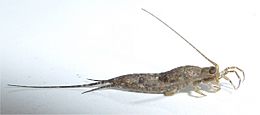Archaeognatha facts for kids
Quick facts for kids Archaeognatha |
|
|---|---|
 |
|
| Scientific classification | |
| Kingdom: | |
| Phylum: | |
| Class: | |
| Order: |
Archaeognatha
Börner, 1904
|
| Families | |
|
Machilidae |
|
Archaeognatha are a group of amazing, wingless insects. They are often called jumping bristletails because they can jump really high! These insects are very old, meaning they haven't changed much over millions of years. They first appeared on Earth during the Devonian period, which was a long, long time ago. This was around the same time as arachnids, like spiders.
The name Archaeognatha comes from two Greek words: Archaeos meaning "ancient" and gnatha meaning "jaw". This name refers to how their jaws are connected. Unlike most insects that have two connection points, Archaeognatha have only one. Another name for them is Microcoryphia, which means "small head" in Greek.
Contents
What Makes Jumping Bristletails Special?
Jumping bristletails were once grouped with another insect order called Thysanura, or just "bristletails." Both groups have a unique "three-pronged tail." This tail has two parts called cerci and one part called an epiproct.
The main difference between Archaeognatha and other bristletails is their amazing jumping ability. They can use their tail to spring up to 30 cm (about 12 inches) into the air! That's like a person jumping over a small car!
Like Thysanura, their bodies are covered with tiny scales. They also have a thin outer skin, called an exoskeleton. This thin skin means they can easily dry out if they are not careful.
Where Do They Live?
There are about 350 known types of jumping bristletails. These insects live all over the world. What's really cool is that they can even be found in the Arctic! This is unusual for insects.
You can often find them living in places like leaf litter or small cracks in rocks. They mostly eat algae, which are tiny plant-like organisms. They also munch on lichens, mosses, or dead plant material.
Are Jumping Bristletails in Danger?
Right now, no types of jumping bristletails are thought to be in danger of disappearing. However, scientists haven't studied them as much as other insects. So, it's possible that some types might be at risk, but we just don't know yet.
Images for kids
See also
 In Spanish: Arqueognatos para niños
In Spanish: Arqueognatos para niños
 | Bayard Rustin |
 | Jeannette Carter |
 | Jeremiah A. Brown |



